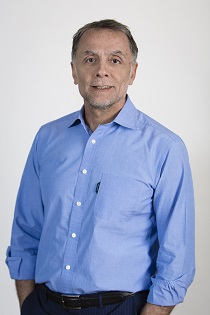
- Founder and Former CEO, Aramex (Shipping & Logistics)
“I understood the power of entrepreneurs, and I understood the power of how we affect society—positively or negatively. Because Aramex was a positive story, I understood how positively it affected youth, young people who wanted to become entrepreneurs.”
Summary
In this interview, Fadi Ghandour, Founder and Former CEO of Aramex, describes his impressive career as an entrepreneur, discusses his beliefs about the nature of leadership, and reflects on his ongoing efforts to give back to his country and his community through education and youth engagement.
Ghandour begins the interview by describing his unlikely path as an entrepreneur, and recounts how his small, start-up courier company in the Middle East eventually came to compete with industry giants like FedEx, Airborne Express, and DHL. The key to Aramex’s success, Ghandour says, was a combination of “being in the right place, at the right time, in the right industry,” as well as his relentless search for a niche market that could set Aramex apart from its competitors.
In the interview, Ghandour describes some of the strategies that Aramex used to compete with FedEx and DHL—most importantly, what he calls the wholesale model. Aramex became the regional partner of major companies like Airborne Express, FedEx, Burlington Northern, and Purolator—handling business for each one individually, using their specific procedures, protocols, and letterheads. This symbiotic relationship, he explains, allowed major companies like FedEx and Airborne a wider global reach, while providing Aramex with access to crucial tracking technology, software systems, and, as Ghandour puts it, a chance to “deliver packages for the big boys and learn from them.”
In this highly competitive environment, strong leadership was essential for everyone at the company—from Ghandour as CEO, all the way down to the couriers out delivering packages. Because of this, Ghandour describes how he worked to create and encourage a corporate culture based around individual entrepreneurship—where all employees would feel empowered to pursue opportunities and take decisions on the ground without needing to wait for permission from superiors. Developing this mentality among Aramex employees was critical to the company’s success, because, as Ghandour explains, the Aramex brand was unknown. In order to compete with established, well-known companies like DHL, he needed highly-motivated employees who would not just deliver packages, but who would be able to promote Aramex and help to build up the brand name and reputation in the region.
After this period of early growth, Aramex began to come into its own. Partnership with Airborne Express, sale on the New York Stock Exchange, and expansion into Europe and Asia, all began to put Aramex on the global map. Aramex also began to innovate new services and offerings that set it apart from competitors. For example, Aramex introduced Shop and Ship, which, in the days before online shopping, allowed shoppers in the Middle East to page through catalogs like JC Penny, Sears, and Hammacher Schlemmer, and have products shipped to them—hassle free—by Aramex. This is just one example of Ghandour’s unwavering conviction that, in order to be successful locally, you must understand and cater to local culture, preferences, and desires. Initiatives like Shop and Ship, Ghandour says, help Aramex maintain a loyal customer base, even in the face of rising global giants like Amazon.
Ghandour concludes the interview by discussing some of his other social and entrepreneurial activities outside of Aramex, in particular, his efforts to support higher education in the region and to promote social dialogue and understanding. Through Ruwwad—which operates in Jordan, Egypt, Lebanon, and Palestine—Ghandour offers university scholarships to promising young people, in exchange for their involvement in community service activities and their participation in focus groups, so that they are actively involved “addressing a challenge in society… [and] feel a sense of ownership of the issues in society.” Indeed, in the interview, Ghandour is clear that these initiatives aren’t a form of charity: “I’m giving [these young people] the opportunity,” he explains, “but [they’re] giving me [their] time.” He takes a similar view when it comes to promoting entrepreneurship in the region. Ghandour credits much of his success to the mentorship of his family and business partners, and seeks to provide the same kind of support to the next generation of entrepreneurs to help the region thrive.
Video Clips by Topic
Human Resources
Corporate Culture
Education
Ethnicity and Race
Fadi Ghandour, Founder of Dubai-based courier company Aramex and a leading entrepreneur in the Gulf, explains that his company purposefully recruited Arabs from the region rather than Western expatriates as he wanted long-term commitment and loyalty, and knowledge of the local language and culture was key to building the business.
Innovation
Social Impact
Start-Up
Additional Resources
- Ruwwad Al-Tanmeya
- Nathalie Billard-Arbelaez, "Influencer Interview: Fadi Ghandour, founder of Aramex," Redbox, August 3, 2016.
- Elizabeth MacBride, "Aramex founder delivers hope in the Middle East," CNBC, February 19, 2015.
- Jess Erickson, "Interview: Fadi Ghandour on Middle-Eastern Startups and Bootstrapping," 500, October 14, 2013.
- Rory Jones, "Fadi Ghandour: Aramex lion will keep on running," The National, April 20, 2012.
- "Dubai’s Aramex may tap debt market to fund acquisitions," Bloomberg, March 26, 2012.
- Fadi Ghandour, "How I Did It: The CEO of Aramex on Turning a Failed Sale into a Huge Opportunity" Harvard Business Review, March 2011.
- "Aramex’s Fadi Ghandour Unfolds His Roadmap for Building Entrepreneurs in the Middle East" Wharton University of Pennsylvania, May 4, 2010.
Interview Citation Format
Interview with Fadi Ghandour, interviewed by Geoffrey Jones, Dubai, UAE, July 4, 2017, Creating Emerging Markets Oral History Collection, Baker Library Special Collections, Harvard Business School.
